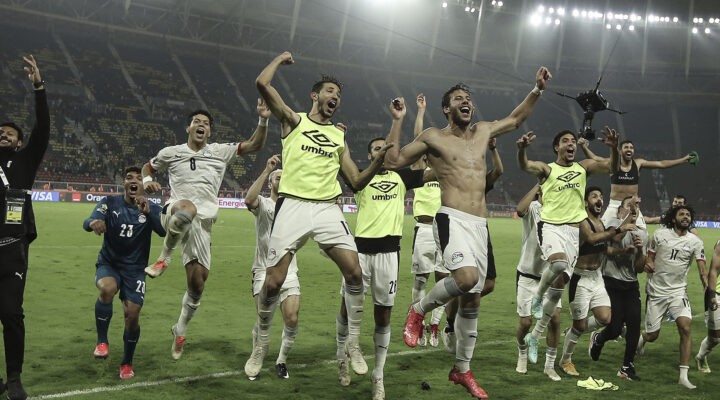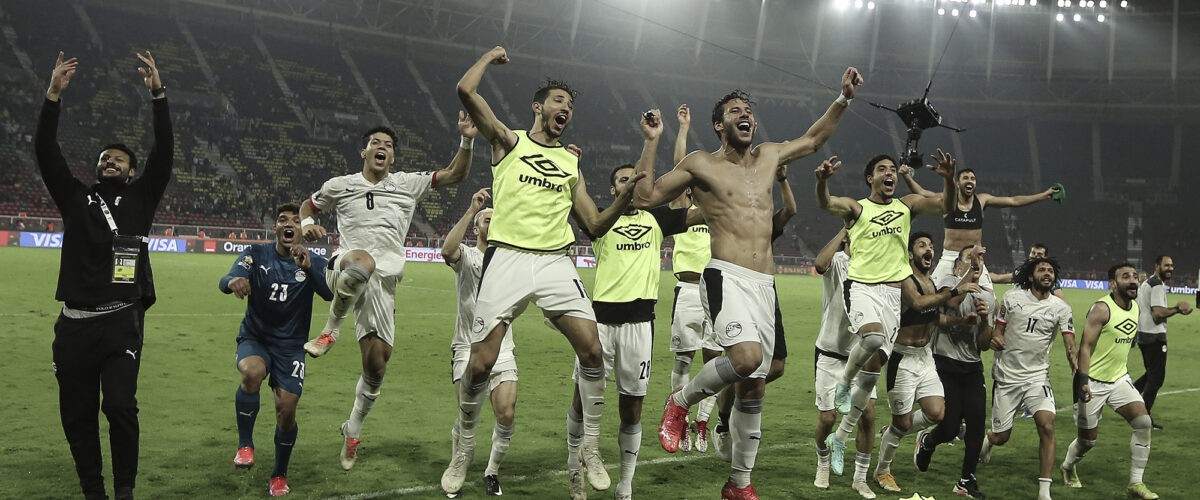In a tweet she shared last year after a virtual meeting with FIFA President Gianni Infantino, the United Nations Deputy Secretary-General, Amina J. Mohammed, described football (soccer in America) as a “humble ball that knows no borders, opens dialogue and enables action for peace and development the world over.”
While few people may want to dispute such claims, it is difficult to ascertain the extent this may have played out with Cameroon, the football-crazy but embattled Central African nation where a secession battle by rebels to carve out an Ambazonia Republic from the country has raged for some years now.
Apart from the Ambazonia crisis, Cameroon also is battling a Boko Haram insurgency championed by Islamic militants in the northern part of the country. Both conflicts have resulted in the deaths of thousands of people, displaced millions from their homes and disrupted educational activities in the troubled regions. According to a United Nations December 2021 report, more than 700,000 children “have been impacted by school closures due to often brutal violence in Cameroon” linked to the crises.
Africa Cup of Nations
Despite these challenges, the government of Cameroon, led by Paul Biya, forged ahead to host the Africa Cup of Nations (known as AFCON), the continent’s top soccer competition.
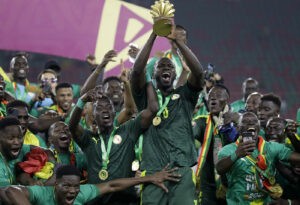
Senegal’s players celebrate with the trophy after winning the African Cup of Nations 2022 final soccer match between Senegal and Egypt at the Ahmadou Ahidjo stadium in Yaounde, Cameroon, Sunday, Feb. 6, 2022. (AP Photo/Sunday Alamba)
For more than three weeks, Cameroonians of different ethnic and religious backgrounds, like many Africans and football lovers elsewhere, were entertained by the skills of many of the continent’s finest soccer players representing 24 African nations that competed for honors in the biennial competition (the 2021 event was moved to this year due to disruption caused by the Coronavirus pandemic).
Aside from the entertainment value, however, opinions are divided among Cameroonians as to what the dividend for the country is, hosting AFCON in the face of challenges. Although the bilingual nation, comprised of French and English speakers, has a bronze medal to show for its participation, such views were evidence of the discontent felt about the crisis in the country, the most devastating of which is the Ambazonia conflict that threatens to split the country.
Others, however, believe hosting the tournament at such a conflicted period was wise because it helped unite Cameroonians of all tribes.
It kept the guns silent
Nuwea Ben Modika, a Cameroon-based journalist, is one such person. He told BNG the competition, which began on Jan. 9 and ended Feb. 6, helped to keep the guns silent.
“The team (Indomitable Lions, with their participation in the event) helped to hold the country together, which earned them patriotic support,” Modika said. “From every indication, there was no single attack in the three troubled regions during the tournament. Even the ghost town phenomenon that paralyses activities every Monday (as a result of the sit-at-home order by separatist fighters in the English speaking southern part of the country) was almost forgotten. There was no reinforcement of such during the AFCON.”
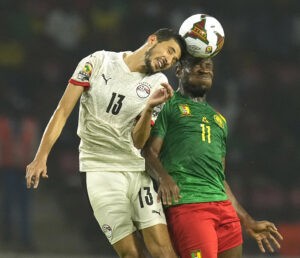
Egypt’s Ahmed Fatouh, left, jumps for the ball with Cameroon’s Christian Bassogog during the African Cup of Nations 2022 semi-final soccer match between Cameroon and Egypt at the Olembe stadium in Yaounde, Cameroon, Thursday, Feb. 3, 2022. (AP Photo/Themba Hadebe)
To Modika, such a soccer-enlivened scene was not surprising. He pointed out that “each time the Lions play, the entire country is really behind the team. No one is bothered about the origin of the players,” and “Cameroonians also digress from other burning issues and focus on football especially when things are going well.”
He added that a similar feeling happened during the FIFA World Cup in 1990, which was “a rough time for Cameroon with multiparty politics but the spectacular performance of the team in Italy healed many hearts in diverse ways.”
To that extent, Modika believes the decision by the Paul Biya administration to host the competition was a good one, and that the country — which previously was denied the right by the Confederation of African Football to host the 2019 edition on the grounds that it was not fully prepared to do so at a time the Ambazonia struggle was at its early stage — deserved to host the competition.
“Definitely, the tournament had to take place. Cameroon won the hosting right years back and there had been serious national and international preparations and (negotiations). The country mourned when a postponement was announced,” Modika said. “After hosting the tournament in 1972, it was time enough for Cameroon as a football giant to host Africa with the new version of AFCON involving 24 top teams. It was equally going to be a huge motivation for Cameroon to beef up her sport and related infrastructure.”
But on the other hand …
Unlike Modika, however, Jiggi Tah, a Cameroonian lawyer and activist from Bemenda, based in Delaware, says being glued to a TV set during a tournament doesn’t necessarily translate to patriotic fervor and that many of the country’s citizens from the south, where he comes from, felt differently about the event.
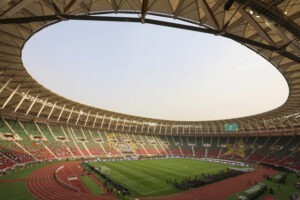
A general view of the stands prior to the start of the 2021 Africa Cup of Nations final soccer match between Senegal and Egypt at the Paul Biya ‘Olembe’ Stadium. (Photo by Ayman Aref/picture-alliance/dpa/AP Images)
“During the games, Anglophone communities were indifferent, and by all accounts the majority of Anglophones were happy Cameroon lost the cup,” he said. “During the games, a stampede occurred at the incomplete Olembé stadium (leading to the death of some fans). Yaoundé and Douala are awash with internally displaced Anglophones; they were not even mentioned. A sense of unity would have been observed if homage was paid to those who perished during the crisis. This hurt a lot of Anglophones and further widened the divide,” he insisted.
As far as Tah is concerned, hosting such a competition at a time of crisis is a waste of resources.
“By most accounts, the tournament was unsuccessful. Before anything else, these kinds of events are meant to make money,” he said. “Several things are responsible for the failure, with endemic corruption and lack of funds being the most glaring. … The stadium that hosted the opening and closing ceremonies is still under construction and has already cost half a billion U.S. dollars.”
He added that given the circumstances, “it was a catastrophic mistake to host the tournament” and that the country is faced with various challenges that the government ought to address rather than take interest in soccer.
“Cameroonians are being burdened with predatory taxes on things like mobile money transfers. Food prices have never been higher. There is a looming cholera outbreak, and these things are happening as a result of Cameroon’s debt obligations,” Tah explained. “The overall cost of this tournament is around $1.2 billion U.S. dollars. This amount alone would have gone a long way to reduce poverty in Cameroon. In the capital, Yaoundé, vast swathes of the people don’t have electricity and running water. … There are places in Cameroon that can only be accessed by going through Nigeria. Hosting the tournament was a monumental misplace(ment) of priorities.”
Is separation inevitable?
And despite whatever hope Cameroonian authorities maintain of keeping the country together, the desire of rebel fighters from Southern Cameroon to achieve an independent nation will be realized, Tah predicted.

Jiggi Tah
“I am a well-known activist, and I am aware of everything happening in Cameroon. I am regularly contacted by U.S. agencies and human rights groups for insight on the conflict. I am in a good position to hold that Africa is about to have a new country. It will not be as big of a shock as South Sudan, because Ambazonia existed as an independent state before. It was called the British Southern Cameroons.
“Cameroon finds itself in the same position Senegal and The Gambia found themselves in 1981; the two decided that each would fare better as an independent country. No voices were raised and not even a match was struck. Today, both countries are among Africa’s most democratic and stable. Anglophones and Francophones have a relationship that transcends politics, and separation will only serve to enhance that relationship.”
Or is there still hope?
Modika, on his part, acknowledges the challenges in the country yet hopes more efforts will be applied to resolving the crises.
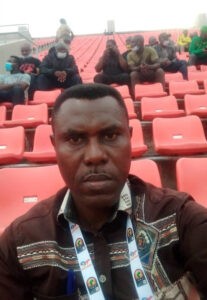
Nuwea Ben Modika
“I will be fooling myself and everyone else if I think this matter is trivial, ” he said. “We got here like a joke, and we can’t tell what tomorrow holds. The government and partners have been taking a series of measures which seem to be insufficient because we are still in trouble.”
He added; : “We need good faith, courage and humility to accept that our errors as a people brought us this far. And since everything we have done has not worked, let’s take another road and do things differently. … Much has gone wrong but with goodwill and determination, it’s possible to achieve peace again in Cameroon.”
Anthony Akaeze is a Nigerian-born freelance journalist who currently lives in Houston. He covers Africa for BNG.
Related articles:
Climate change is heating up the terrorist conflict in Africa’s Sahel region
In Africa, the challenge is not just low vaccine numbers, there’s also vaccine hesitancy

